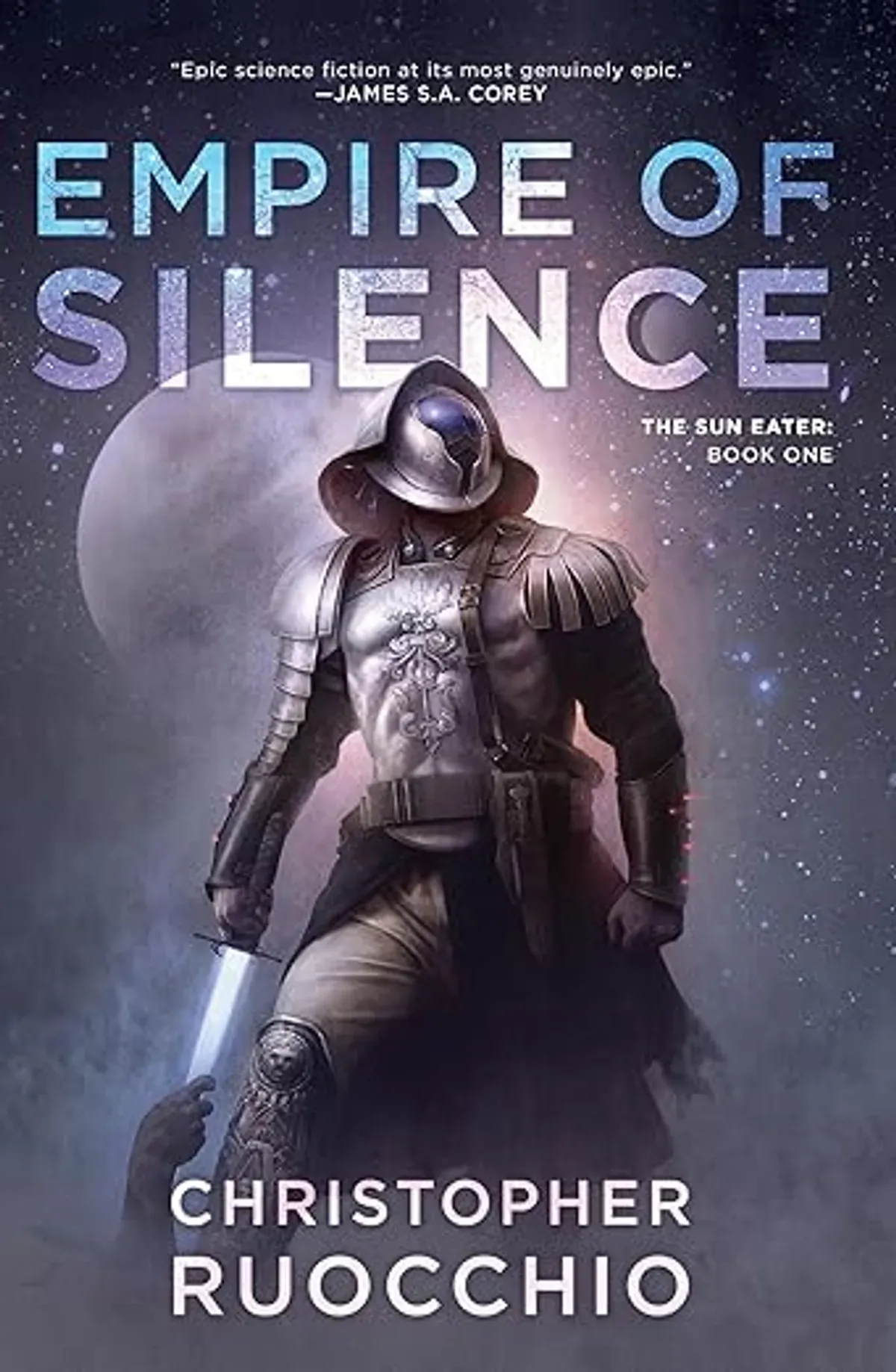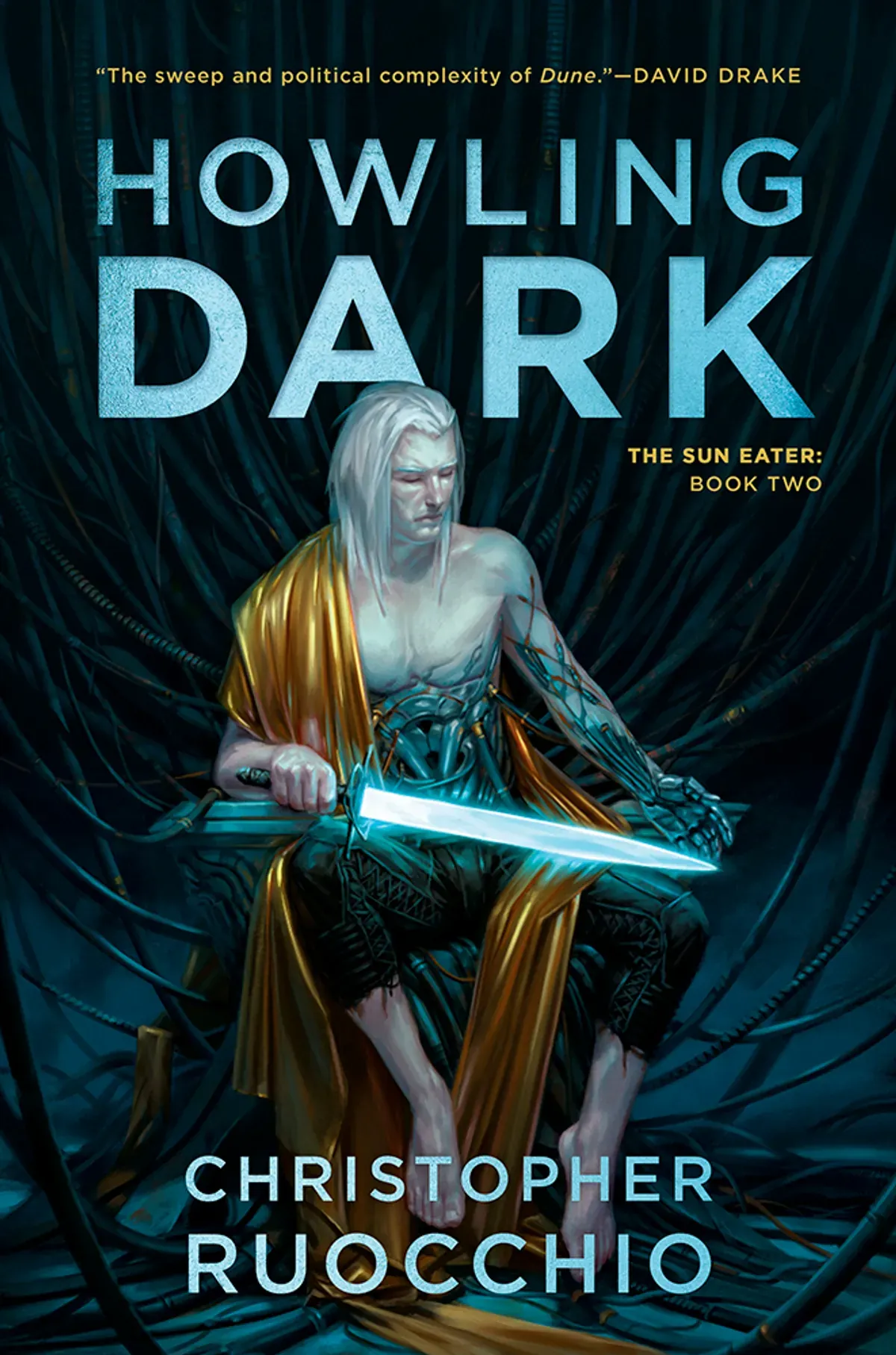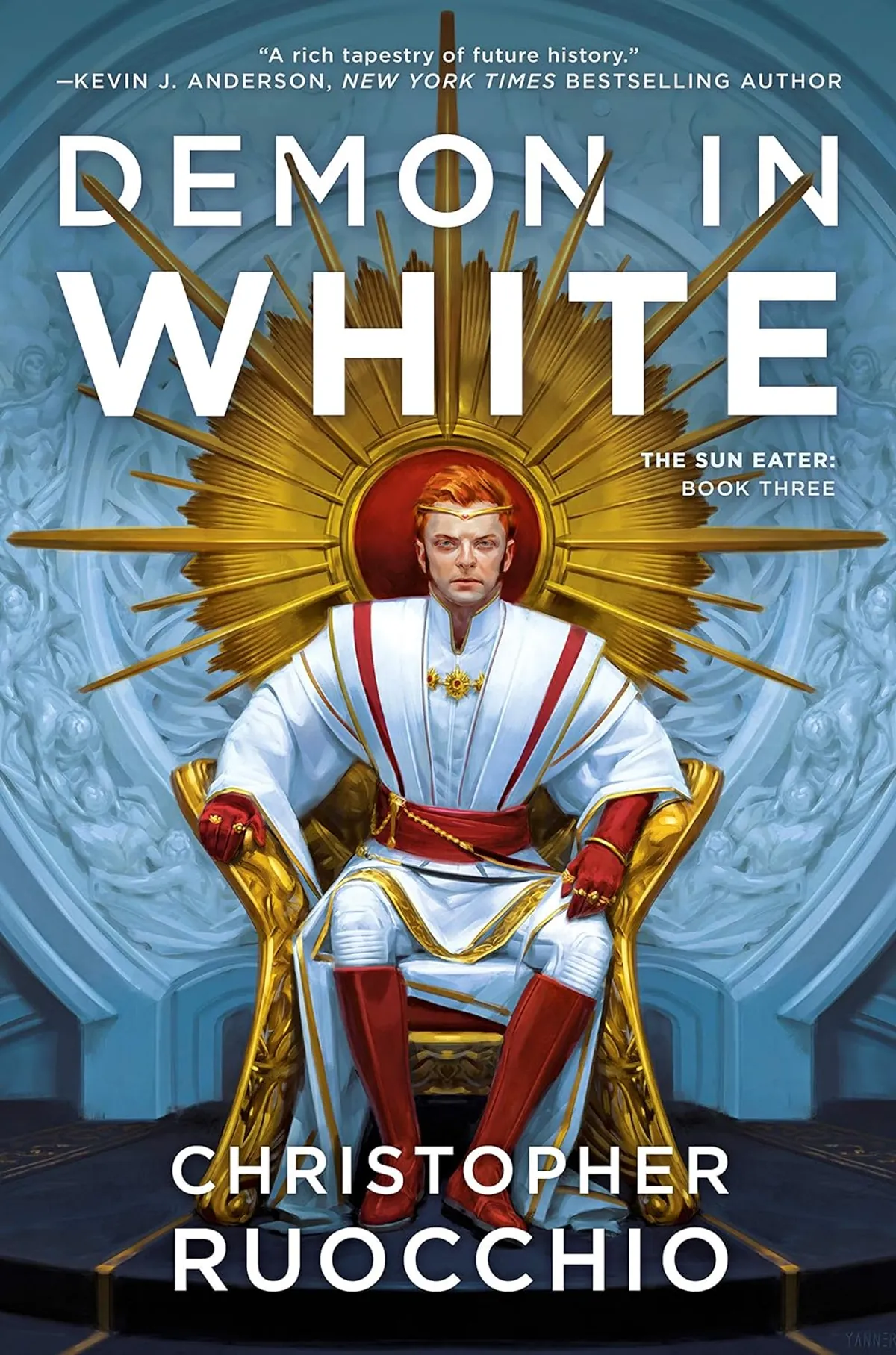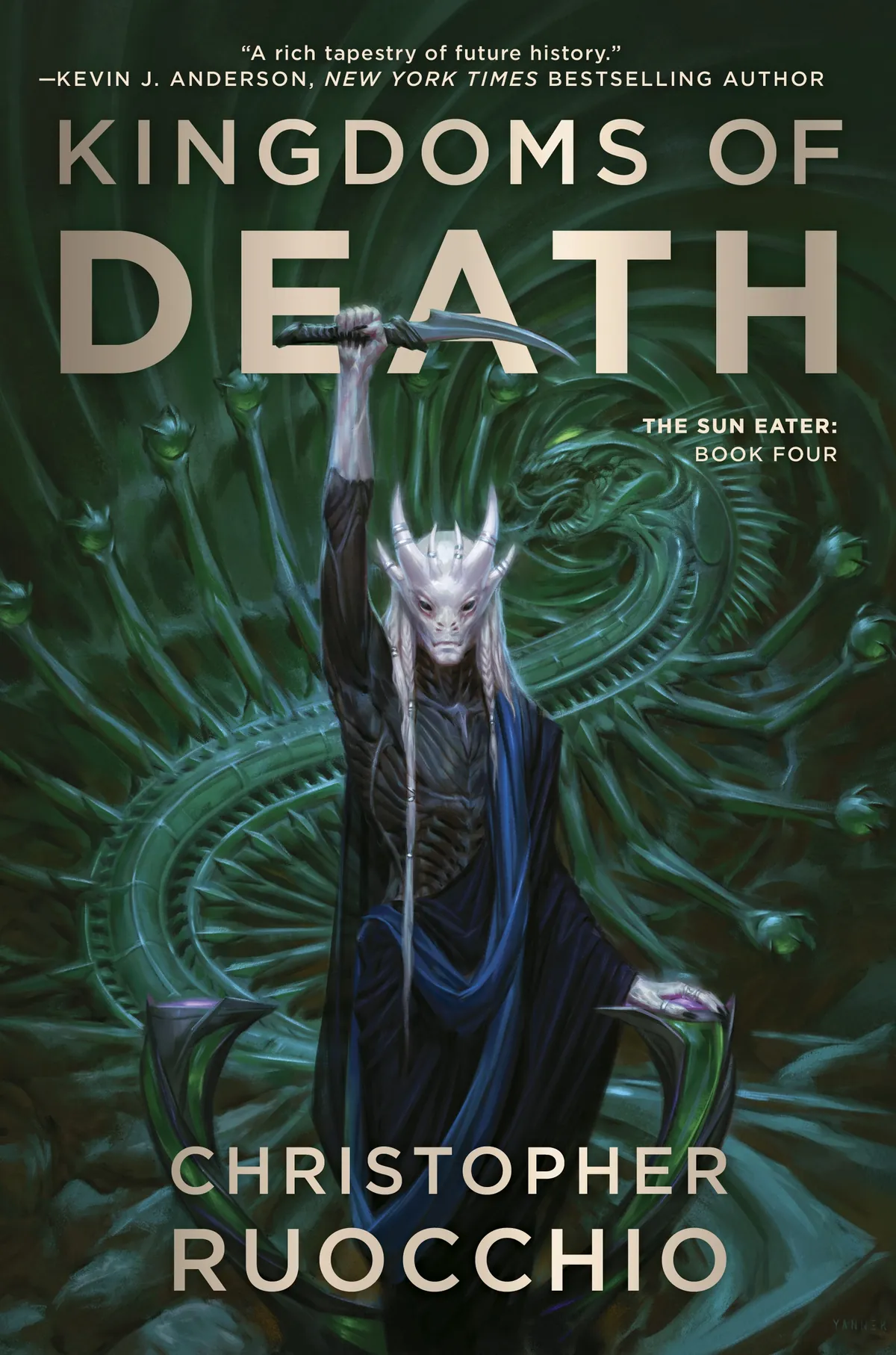Empire of Silence
by Christopher Ruocchio
Reviewed by Devin Ford on June 20, 2025
Est. Reading Time: 9 min

Quick Info
Title: Empire of Silence
Author: Christopher Ruocchio
Series: The Sun Eater (Book 1)
Published: July 3, 2018
ISBN-13: 9780756413002
At a Glance: The Making of a Legend
Empire of Silence is the sprawling origin story of Hadrian Marlowe, who will eventually become the Sun Eater, the figure of both hero and villain to the peoples of the galaxy. Christopher Ruocchio writes a space opera that feels more like an extended prologue to an epic saga than a standalone story, following the transformation of the young Hadrian from pampered nobleman’s son to reluctant warrior across several worlds and situations.
Young Hadrian flees his father’s attempt to make him a torturer-priest in the Chantry, and is left stranded and destitute on the backwater planet Emesh. In gladiatorial combat, political intrigue, and his first encounters with the alien Cielcin, Hadrian starts his journey to becoming the legendary figure who will one day destroy a sun and reshape the galaxy. Ruocchio constructs an expansive universe with intricate details but maintains the narrative focus on personal stakes and character development.
Roman Empire Among the Stars: A Feudal Future
Ruocchio does a great job blending ancient and futuristic elements to create a science-fiction take on the Roman Empire, with galactic palatine nobility, house politics, and a rigid class structure, but with a future religion, the Chantry, that has an inquisitorate that seeks to curb technological advances. The fundamental conflicts between religious orthodoxy and technological progress steer much of the narrative.
There’s a great deal of worldbuilding throughout the novel, with details from Delos’ uranium mines to the gladiatorial pits of Emesh feeling well fleshed out. The larger economic system of the Empire with its interstellar trade, planetary resource gathering, and politics between houses feels complex and genuine. The struggle between technological development and the Chantry represents genuine conflict which transcends basic good vs. evil scenarios.
One of the strongest elements of worldbuilding in the book is the Cielcin. They’re not just villains, but a genuine alien species with their own culture, language, and motivations. Hadrian’s struggle to understand and communicate with them was one of the book’s most engaging sequences, and it touches on themes of xenophobia, communication, and the cost of war that will likely be explored throughout the series.
From Privilege to Purpose: Character Through Adversity
Ruocchio crafts Hadrian Marlowe as a character who shows deep emotional resonance through his dramatic flaws. He moves from sheltered noble to jaded survivor while the story’s various components come together. The dynamic is heightened by the privileged beginnings of the character. Ruocchio effectively uses these to explore themes of class, responsibility, and the contrast between the noble intention and the reality of life.
The supporting cast of characters works well, although some of them feel more like set dressing than characters. Cat functions as both a narrative device that propels Hadrian’s development and as an emotionally significant figure whose foreshadowed fate enhances the story’s depth. Valka, the xenobiologist who shares Hadrian’s interests in the Cielcin, offers emotional companionship and romance as well as fuel for the book’s mysteries.
The story’s presentation as Hadrian’s memoir is interesting, as it allows for characters to reflect on the events and foreshadow them. The story’s later events are briefly revealed through hints that sometimes become wearisome while Hadrian’s retrospective musings from his older self can sometimes come off as too instructional.
Deliberate Foundations: Plot and Pacing
Empire of Silence, like a foundation stone, lays down groundwork for what promises to be a sweeping series. There’s a deliberate pacing, focusing on character development, the political landscape, and relationship development over immediate payoffs. It’s to the book’s credit that the worldbuilding is effective, but readers seeking more instant gratification may find themselves wanting.
The episodic structure benefits and simultaneously detracts from the novel’s overall narrative. The distinct segments that Hadrian experiences with his family, his exile, his gladiatorial career, and his involvement in xenological research serve to highlight the different ways that his character develops through each circumstance, but also occasionally jarringly disrupt the story flow, as though we’re reading several different stories rather than one.
The political machinations and the gladiatorial segments of the book provide the strongest narrative beats, as Ruocchio particularly excels in demonstrating the myriad of causes behind ostensibly simple conflicts and in the simple beauty of the stark reality of the gladiatorial ring, where characters we might like may have the most wretched of ends.
Between the Sheets: Character Bonds Over Romance
BroMantasy Spice Rating
Barely There
(Chaste Romance)
Romance takes a back seat to character development and political intrigue throughout Empire of Silence, earning a spice level of 🌶️ (1.0). The emotional bonds between characters emerge naturally from the story instead of being created to attract viewers. Hadrian’s connections with others emerge from shared experiences and mutual respect rather than immediate attraction or forced romantic tension.
The romantic elements that do appear serve to humanize Hadrian and provide emotional stakes beyond his own survival. These relationships show his capacity for genuine connection despite his aristocratic background and the dehumanizing experiences he endures. The measured approach to romance allows the focus to remain on the larger themes of war, politics, and cultural conflict.
Bro Reading Comfort: Politics and Warfare Dominate
Empire of Silence poses little to no concerns for public reading with a rating of 😳 (1.0). The story has a strong focus on politics, warfare, and philosophical arguments about civilization and xenophobia. Any romantic elements are done in an extremely restrained way and do not serve to gratify or titillate.
The cover art and topic make it obvious that the book belongs in the military science fiction and space opera genres, which are traditionally male-dominated but which do have significant crossover appeal. There is a great deal of traditional masculine content to be found in the strategic planning, combat training, and political maneuvering that occur, with little romantic focus to worry about.
Darkness Factor: Political Tension and Combat
Empire of Silence earns a darkness rating of 💀💀 (2.0) for its political machinations and gladiatorial combat without getting too dark. The story includes war and social inequality elements but steers clear from depicting them in a way that would qualify as horror. This story focuses on adventure and character development rather than gore and psychological trauma.
The darker aspects of this world are primarily from the political machinations of the Empire and the conditions of gladiatorial combat, but these are presented as obstacles to character growth, rather than horrific conditions. The social inequality and religious strictures are sources of tension and conflict, but the narrative remains optimistic about Hadrian’s ability to overcome these institutions.
The conflict with the Cielcin is xenophobic and misunderstandings, but these are treated as problems to be solved by intelligence and diplomacy rather than fates to be mourned. The atmosphere remains optimistic despite the serious subject matter.
Book Battlefield: Influences Shrouded in Controversy
Empire of Silence has drawn criticism for its perceived similarities to other works. Christopher Ruocchio expressed surprise at the comparison between his work and Dune and The Name of the Wind while stating his desire to match only a fraction of their success.
Ruocchio draws on his own experience with Classics for the novel, stating that “I have this giant, all-encompassing vision for the series, which is part Trajan’s Rome, part Justinian’s Byzantium, and part Victoria’s Britain, with a smattering of Qing, Mauryan, and Imperial Japanese influences.” As for literary inspiration, he names Homer, Dante, Shakespeare, Milton, The Romance of the Three Kingdoms, the Ramayana, and more modern SF/F writers such as Tolkien, Herbert, and Bujold.
The book has drawn criticism beyond mere influence. Several readers noted particular sections which bear similarities to other writings including Book of the New Sun by Gene Wolfe. Others have noticed structural similarities to The Name of the Wind, including “a beat-for-beat lift-and-shift of the street urchin arc”. Online discussion about Empire of Silence compares it to a collision between Name of the Wind and Dune inside a particle accelerator.
The ongoing controversy demonstrates the delicate boundary between homage and appropriation in genre fiction without much public response from Ruocchio about the claims.
Should You Bother?
For Space Opera Fans: Empire of Silence delivers on the promise of political scope, complicated factions, and scope without sacrificing character-driven stakes.
For Character-Driven Readers: While the personal stakes of the protagonist’s journey from privilege to purpose are compelling, supporting characters can sometimes feel less developed. The memoir structure gives the protagonist’s arc added depth.
For Political Thriller Fans: The layered relationships between noble houses, religious authorities, and alien powers provides a multitude of conflicting factions beyond mere conflict.
For Series Readers: This novel works optimally as the initial book in a multi-part narrative and is a great introduction to the series. For readers seeking standalone stories, the pacing can feel slow, and the ending is open-ended.
Final BroMantasy Verdict
With an 3.5 rating, Empire of Silence achieves the goal of laying the groundwork for what will hopefully be an impressive space opera, while offering less payoff than the reader might like. Ruocchio has done excellent work building the world and the characters and establishing the stage for an epic conflict, but it does so at the expense of instant gratification and continuity. Empire of Silence might be best enjoyed by those who value setup over payoff, as it has the latter in spades.
The book has successfully achieved its aim of establishing the foundation for a galaxy-wide conflict, and is populated with a dynamic cast. It’s the political machinations that feel real, the worldbuilding that pays off, and the character development that gives weight to the world. But sometimes the build-up to the payoff feels like foreshadowing for future novels, at the expense of an active present.
Empire of Silence explores themes of identity, responsibility, and sacrifice that feels deeply moving, despite the familiarity of the space opera and political intrigue setting. The political and personal difficulties that Hadrian faces are real, but he needs to find his way through them without destroying his moral compass. He needs to maintain his principles while navigating complex decisions. These elements feel fully realized and provide the narrative payoff of character development.
The book’s greatest strength is its ambitions and scale. Ruocchio is promising something big, and Empire of Silence is setting the stage for that. Even without standalone effectiveness Empire of Silence commands attention through its complex characters and deep world-building that warrants further exploration in subsequent books.
I believe the writing and theming are indicative of a writer who can deliver on the promises made in the opening volume. Readers who appreciate slow-build, the value of world-building, and the satisfaction of deep characters will find plenty to love, while those looking for more fast-paced action will have to wait for the next book.
You Might Also Enjoy
Frequently Asked Questions
Is this book part of a series?
Yes, this is book 1 in the The Sun Eater series.
How spicy is the romance?
We rate the spice level at 🌶️ (1/5). Romance is there, but it's not particularly titillating and is there to flesh out the characters rather than be the main thrust of the story
How uncomfortable is it to read in public?
We rate the public reading discomfort level at 😳 (1/5). Safe for public reading, but the romance is a side issue to the politics and the war
How dark are the themes in this book?
We rate the darkness level at 💀💀 (2/5). Some internal conflict and the odd arena duel but it's not the major focus of the story and it's not graphic
What age group is this book for?
This book is generally recommended for adult readers due to its mature themes. We recommend checking specific content warnings if you are sensitive to certain topics.





